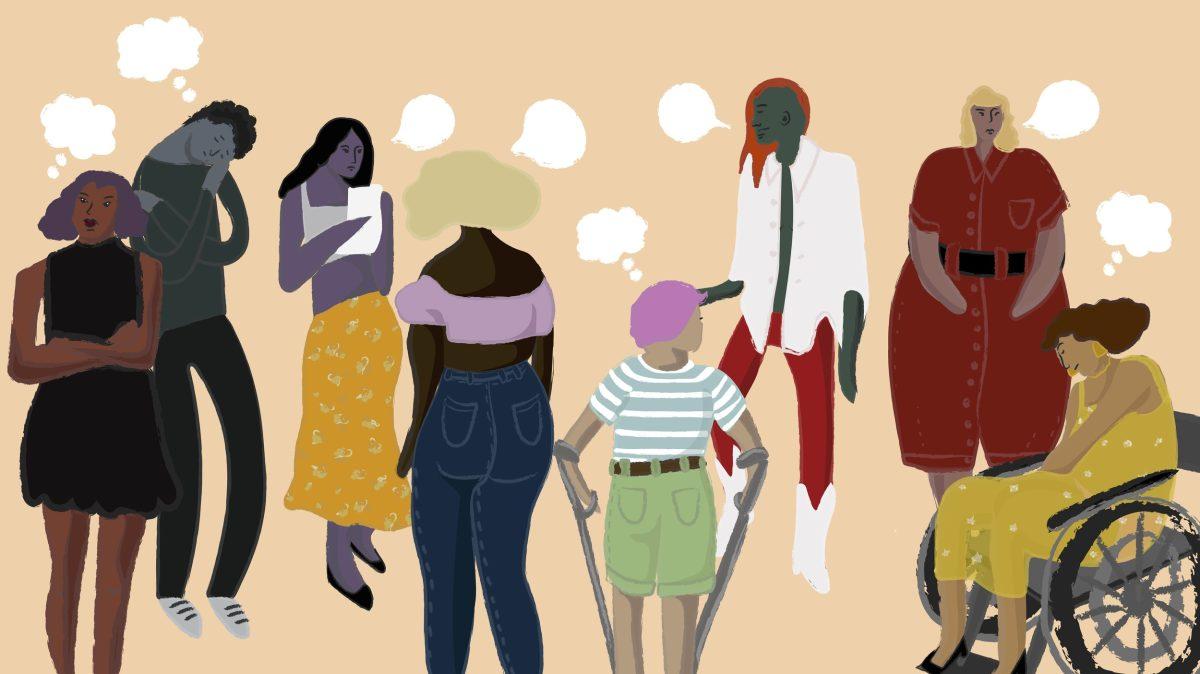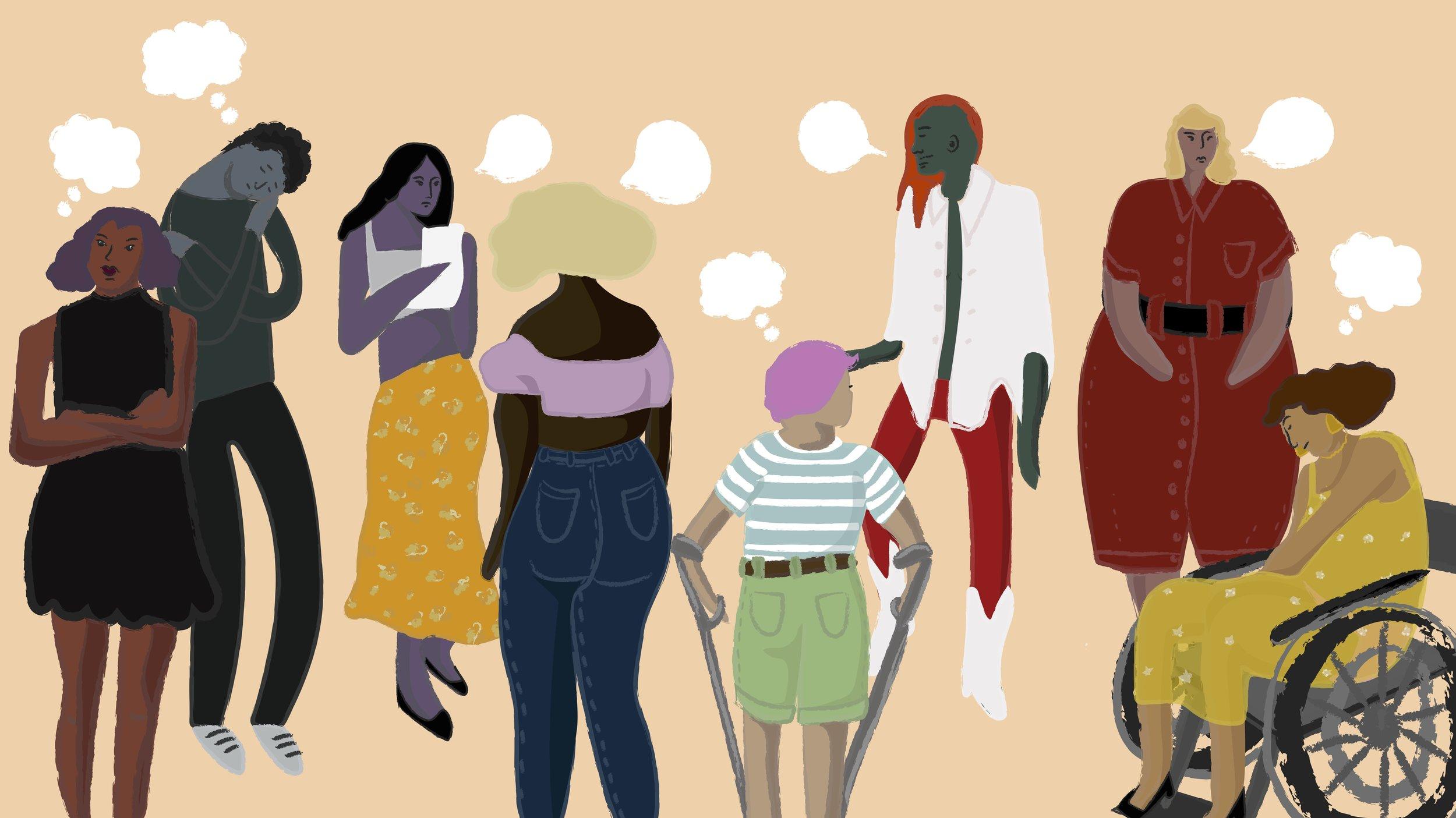University of Texas at Austin students and professors discussed the challenges minority students face on UT campus and in academia at large On Thursday, Oct. 18, in the Multicultural Engagement Center.
Story by Sage Foster
Illustrations by Diane Campos
The panel, “Inside the Ivory Tower: A Look at Diversity in Academia,” intended to create a dialogue about the challenges students belonging to minority communities face in higher education. Panelists included Professor Mónica Jiménez, Professor Nicole Burrowes and Natassja Gunasena, all of whom teach in the African and African Diaspora Studies department at UT. The three answered questions about their experiences navigating academia as women of color and provided advice to students.
During and after the panel, students openly discussed how their identities as members of minority communities have affected their experience at UT. “As minority students, it feels like a lot of our concerns aren’t viewed as valid compared to other students’ concerns,” says Ida Kamali, government and economics senior. “UT often demonstrates through their stances on issues that this campus isn’t built for us. There’s a lot of microaggression that comes out in academic settings, like when professors will ask for your opinions in class not from an academic perspective, but because they want to hear your personal experiences as an immigrant, or as a person of color. It’s very exotifying.” The issue of invisibility versus hypervisibility surfaced multiple times throughout the panel, as students and panelists discussed their experiences in academia as feeling either showcased or completely ignored.
Chemistry sophomore Tanvi Senghal says she dropped her physics class last semester after she was consistently ignored by her professor when she tried to contribute to class discussion, in spite of the fact that she sat in the front row. “As a STEM major taking mainly introductory courses in large lecture halls, I feel like there’s a real lack of cultural competency,” Senghal says. The idea that introductory courses are often the ones that focus the least on diversity issues and helping students feel connected is problematic because the earliest years of college are when most students need support the most. During the panel, Jiménez spoke about her experiences with imposter syndrome in academia and how long it took her to actually believe that she belonged there. International relations senior Kim Coronado also shared experiences of feeling out of place and disconnected. “I have two experiences, one as a minority student and one as someone who is not American,” Coronado says. “The way that academia is set up, it’s not really set up for students from Latin America and other parts of the third world to succeed. There are not that many spaces on campus where we can feel like we have a piece of home here.”
While Senghal says cultural competency training for professors and other faculty members would be a good initiative, she expressed concerns that the University doesn’t currently have the resources to implement this in a way that would be helpful to students of color. “The representatives for people of color at this University often feel like they are just pawns for the institution, so even if they are a person of color it doesn’t feel like they can actually uplift students of color,” Senghal says. This concern is often brought up in dialogue about ways what way be earnest attempts by the University to aid minority students are failing, but may have less to do with UT specifically and more with structural flaws in academia as a whole. “The further you progress in academia, the more you tend to lose your way because you are kind of forced to assimilate for the sake of survival,” Senghal says. “It’s really hard to maintain your ideals in that environment.”
Because of the University’s failures to adequately support its minority students and invest in cultural competency education, some students at the panel expressed their frustration at having to educate their fellow classmates, an act commonly referred to as “invisible labor.” Gunasensa described this in terms of the familiar scenario of being the only black student in one’s class, and the pressure it puts on students. “You’re essentially being forced to represent your entire diaspora through your behavior every day,” Gunasena says. Burrowes tried to emphasize that this is not minority students’ responsibility. “As a student, it’s not your job to educate everyone else in the classroom unless you want to,” Burrowes says. The professors also described the struggle to a desire to avoid performing invisible labor and also fulfilling their roles as educators. “For me, I view teaching as a form of activism,” Jiménez says.
The professors also tried to encourage students to prioritize self-care in what can be an emotionally and physically exhausting academic environment. Both Coronado and Senghal expressed that the MEC had provided them with a safe space and a sense of community among people of color that they wouldn’t have been able to find anywhere else. This is an example of something the University is doing right, and that students would like to see more of. Coronado would also like to see more professors of color on campus. “When you start seeing people who look like you in positions of power, it’s a great inspiration, especially for first generation students, because you wouldn’t imagine someone like you doing that kind of job,” Coronado says. Coronado also suggested the University implement programs that aid lower income students with transportation and food in order to make sure these students can succeed on campus.
The panel at the MEC provided a space for students and faculty to come together and discuss important issues that may be invisible to some of us, but that minority students are faced with every day. Discussions such as these are the first step in a long fight toward making academia an inclusive space of opportunity for all students and faculty members. “I can tell you that every minority student here has felt invalidated in at least one way at this institution, whether it’s been in a personal or academic situation,” Kamali says. “We shouldn’t just accept that as a reality, we have to enact real change.”












































